| Reviews & Columns |
|
Reviews DVD TV on DVD Blu-ray 4K UHD International DVDs In Theaters Reviews by Studio Video Games Features Collector Series DVDs Easter Egg Database Interviews DVD Talk Radio Feature Articles Columns Anime Talk DVD Savant Horror DVDs The M.O.D. Squad Art House HD Talk Silent DVD
|
DVD Talk Forum |
|
|
| Resources |
|
DVD Price Search Customer Service #'s RCE Info Links |
|
Columns
|
|
|
Planet of Snail

I have to confess to making a flippant joke as we settled in to watch the DVD of Yi Seungjun's remarkable, lyrical, very moving documentary Planet of Snail: Knowing that the film deals intimately with profound matters of human existence, I proffered some inept crack about how disappointed I'd be if it wasn't a monster movie about a fantastical world, in a galaxy far away, run by scary warlord-molluscs. The film, as intriguing, affecting, and mysterious as it is simple and direct, in no way deserved my disposable stab at insouciance, least of all for its seemingly gnomic title, which makes perfect sense: The planet we're being taken to is our own, but the film lets us know that familiar place in new and beautiful ways through the experience of its subject, a young South Korean man called Young-chan, and the mutually dependent (but hardly "co-dependent," to employ a usually iffy psychobabble term), deeply loving relationship he has with his wife, Soon-ho. Both are disabled, the deaf-blind Young-chan more so than his wife, whose growth and physical capabilities have been affected by what appears to be a spinal condition. It is principally Young-chan, who relates to the physical world in in a way slower and more tactile (i.e., "snail" like) than most of us can imagine, whose experience Yi's camera attempts, with impressive success, to bring us close to, even partly into (no mean feat; the camera eye tends innately to "see" more like the standard human one, not those of Young-chan). Like a snail emerging from its shell to engage with the world, not so much with the aid of its eyes (which barely sense shifts in light) as through its halting and hypersensitive physical orientation to the world around it, Young-chan experiences the rich extremes of inward and tactile experience with less effort than the rest of us normally sighted and hearing people find readily possible, delving deep into his imagination and lingering over physical sensations with a joy and intensity that's both pleasurable and enlightening to witness.
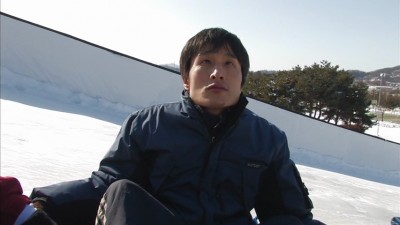
Yi hones what must have been scads of footage from Young-chan's and Soon-ho's daily lives into a structure that's lean (the film clocks in at around 90 minutes, which fly by despite its taking its time with what it's showing us) and a rhythm that's completely relaxed: The filmmaker's virtually exclusive concern is to focus our attention on the moments that best let us into the closeness of this relationship, and the extraordinariness with which Young-chan interacts with and responds to the home, institutional, social, and natural environments in which he finds himself. The scenes are flow together and connect one to the next mostly through establishing and expanding upon this most worthy aim: Young-chan and Soon-ho fly a kite, make and eat their supper, get Young-chan through an exam for a Hebrew class he's taking (the breadth, depth, and effort of his desire to expand his mind would make him unusual above and beyond his physical obstacles), and go inner-tubing in the snow, all while Young-chan does his artistic work, writing essays, poems, and plays (one of which we also see very briefly in the process of rehearsal and performance) via his braille pad. Adding another, enhancing aural layer at some key moments, Young-chan also reads in voice-over from his writings so that, to cite just one example, as we see him maneuver his way with his cane down a crowded sidewalk, his own verbally articulated, poetical expression of what that experience is like for him is the accompaniment on the soundtrack. One prolonged sequence involves what is for this couple the complicated and challenging changing of a fluorescent light bulb in their bedroom, which is conscientiously shot and edited by Yi so that we can feel the unusual time and care it takes for them to perform this simple task, and the victory they feel when they pull it off without a hitch.
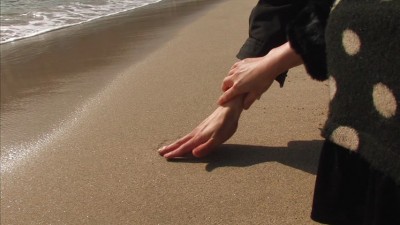
That sense of triumph modestly taken in stride, like everything else in the film, benefits greatly from Yi's refusal to overemphasize, his insistence on maintaining the true-life texture of Young-chan's and Soon-ho's day-to-day existence. He thankfully sidesteps the pigeonholing or condescension that could easily tempt even the best-intentioned documenter of people like Young-chan, with his unusually proportioned balance of physical senses and accompanying higher sensitivity and enhanced powers of perception in some respects. The beauty of his and Soon-ho's accomplishment in replacing the bulb comes not from a superimposed, false aura of saintliness (Young-chan and Soon-ho are too genuinely in love and decent to need such a thing), or from some lack of faith that they are capable of pulling it off, but from Yi's patience in documenting the process as it unfolds. The effect this direct-documentary style has is to neither that of a sycophantic pat on the back nor of a lugubrious, pitying stare, but a well-earned celebration of a difficulty overcome and an acknowledgment that ordinary tasks do present additional difficulties for a disabled person. When Yi gives us a long sequence of Young-chan and Soon-ho at play, inner-tubing in the snow down an icy hill, it says neither "How amazing that disabled people can do this" nor "How unusual, how difficult it must be for them to engage in such things," but rather an eminently conscientious attitude, a respectful curiosity that sincerely wants to know, "How does it feel for that person, who sees and hears and physically feels differently than most of us, to participate in life through these activities?" The saintliness issue is additionally resolved by Young-chan's complex, half-teasing, sometimes abruptly sharp (and, at one of the film's point, quietly generous and tender) relationship with a best friend, a fellow blind man who complains a bit too much that he hasn't found the kind of love and support Young-chan and Soon-ho provide each other, and is rather harshly rebuked by Young-chan for his self-pity. The exact subject of the ambivalent mixture of conflict, resentment, and abiding fondness and dedication between the two men -- the additional difficulties of finding a mate when one is blind or otherwise disabled -- may be fairly unique to them, but the mixed feeling of affection, envy, and rivalry is known to more or less any human being, and Yi thus once again delicately balances the particularity of Young-chan's world with the more universal aspects of his experiences.

There are a couple of dramatic episodes in which the interest and care we've developed for the couple springs into more direct, conventional action, as when we pull for Young-chan to win an essay contest he's entered (his writing, both poetic and first-person essayistic, permeates the film, so we now that it's entirely within the realm of possibility that he would take a prize) and impatiently await the results along with the two of them, ready to join in either the victory or the disappointment. Or when, on the advice of a counselor they both see who helps them maneuver the special logistical and psychological needs of their conditions, Soon-ho is advised to not accompany Young-chan so much, to let him take a journey without her because her own health may very well one day take her away, at least temporarily, and necessitate some period of independence for Young-chan. She obligingly allows this, and in the cross-cutting between her anxious waiting and Young-hoon's foray without her, we can sene the removal of the safety net, the relief at their reunion despite not having been separated in any seriously threatening way.
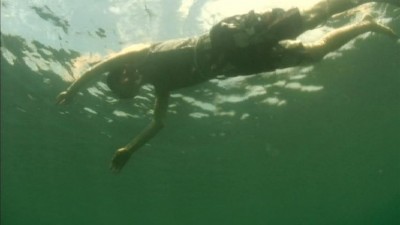
But Planet of Snail is for the most part experiential, immersive; we cut to Young-chan's point of view when he's sliding down that slope, or Yi's camera will move in extra close (and then cut even closer, almost to abstraction -- one of the film's gorgeous and effective ways of taking us away from our literal manner of seeing of things and further toward Young-chan's subjectivity) to capture Young-chan's fingers as they explore, as they "see," through his fine and patient touch, a tree's bark and its leafy branches blowing in the wind, or the feel of beaded water on their balcony railing as it drops off. And then there's the film's most consistently recurring image, the entangled hands of the couple as they "talk" (or as Soon-ho translates) through a tapping, Morse code-like mode of communication used by some blind people and known as finger braille -- an act of simple touch whose combined uxorial, loving significance and practical ingenuity as its own language is something one could watch, transfixed and enraptured, for hours (at least the way Yi shows it to us through his lovely compositions and editing.
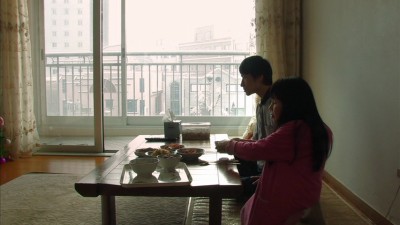
Planet of Snail is never pious or sentimental about anything it shows us. It takes for granted that we already know to respect the dignity of physically disabled people and to defer, as individuals and societies, to their particular needs. It thus has no social cause to crusade for, and it's free to take a step further, to let us know from the inside out the lives of a person afflicted and gifted in specific ways through his disability, to let us accompany him, at least for a little while, in a focused and meaningful manner that makes every thoughtful attempt to never patronize or gloss over any particularity of what his life is like, but to value him and what he goes through, good and bad, specifically and in detail for precisely and thoroughly who he is, including but not limited to his disabilities. This is a documentary that means not to expose any presumed deficiencies in our consideration for the deaf, blind, or otherwise disabled, but to invite us to take that sustained leap of the imagination required to go beyond mere decency, to perhaps get to one of the best, highest states of mind available to us humans; it's an attempt at deep, true cinematic empathy, and it fulfills that noble, elusive ambition to a compelling, near-complete, and entirely unforgettable degree.
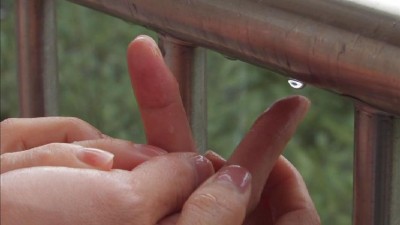
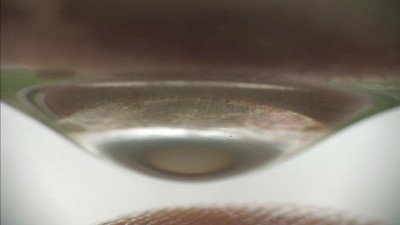
THE DVD:
The anamorphic-widescreen transfer (aspect ratio of 1.78:1) is another example of digital video making the transition with ease to digital home media: The colors and the different interior and exterior lighting qualities in are clear, vivid, and nicely variegated, and skin tones are natural throughout. The only small complaint is a few moments of haloing around sharp lines due to edge enhancement; otherwise, the picture quality is very high.
Sound:The Dolby Digital 2.0 soundtrack (in Korean with optional English subtitles) delivers fully intact the minimalist soundscape (mostly dialogue, direct and voice-over, and direct/ambient sound) that has been impressively captured and mixed by the film's sound team, for an experience as vibrant aurally as it is visually (the music in the film is minimal, but it's bass-y when it's there, and the deepness of the sound definitely passes the test).
Extras:About 12 minutes of deleted scenes depicting further educational and creative activities engaged in by Young-chan and Soon-ho, from Young-choo's tentative and self-conscious attempts to branch out into the graphic arts through drawing to his treating his wife's physical ailment through apparently regular acupuncture sessions (not seen in the finished film) to their participation as the congregation of their church sings a Korean version of "Silent Night" for Christmas.
--The film's U.S. theatrical trailer along with a handful of other great (and that's not just hyperbole) Cinema Guild titles, one of which, Marwencol, with its markedly different subject and approach but very similar theme, dovetails nicely with Planet of Snail as a film that allows us to experience in some clear, direct way the dignity, value, and specific challenges and inspirations of a disabled person's life.

Planet of Snail is an almost non-narrative documentary, an intimately focused, respectfully but genuinely curious look into the married life of a disabled Korean couple, that structures itself much less as a chain of events than as a rigorously selected and painstakingly assembled sampling of what their existence feels like from the inside. It focuses most particularly on the interaction of Young-chan, the unsighted and non-hearing husband, with his supportive but down-to-earth wife and the world around him, whose specific proportions of dangers and pleasures stands in contrast to those of the average person. It unflinchingly, but always with utter respect, explores both the unique limitations and the extraordinary insights afforded by having one or more of one's senses made unavailable; by the time it's over, after director Yi Seungjun has used his camera (often through extremely close or even abstract images) and his soundtrack (replete with Young-chan's fine-tuned, poetic thoughts and observations about the world and his place in it) to let us into a place where we're not just observing Young-chan but actually sharing his point of view to a remarkable extent, it seems like the artistic/creative path Young-chan has chosen for himself is an obvious and very fitting one -- an inspired and pragmatic channeling of the deeper use of his other senses that his disabilities require of him, and of the new vocabulary he's arrived at by necessity, with the kind of evocative, unusual descriptions of experience and objects that poets have always longed and striven to attain. A poem is just what Planet of Snail becomes, too: Its apparent simplicity, its concise use of sound and image, is a powerful catalyst that incites the imagination, giving us the precious gift of access to a deep interest, responsiveness, and empathy of just the elusive sort that lies dormant until illuminated and engaged by a potently compassionate, accomplished work of art like this one. Highly Recommended.
|
| Popular Reviews |
| Sponsored Links |
|
|
| Sponsored Links |
|
|
| Release List | Reviews | Shop | Newsletter | Forum | DVD Giveaways | Blu-Ray | Advertise |
|
Copyright 2024 DVDTalk.com All Rights Reserved. Legal Info, Privacy Policy, Terms of Use,
Manage Preferences,
Your Privacy Choices | |||||||













